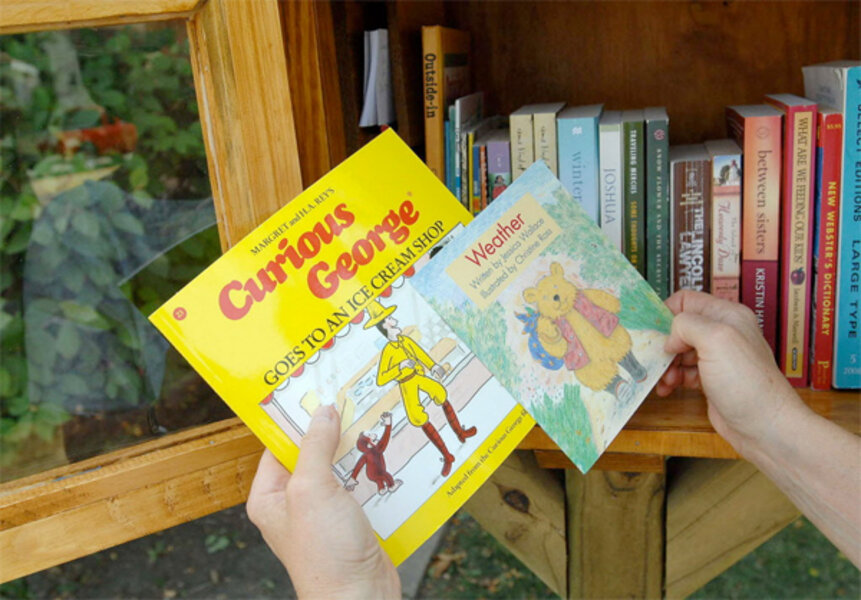'Bookless libraries' – has it really come to this?
Loading...
The paperless office, the currency-devoid bank, the jobless recovery. The latest in a string of euphemistically-named contradictions? The bookless library.
It began with the academic libraries. Kansas State University’s engineering school went bookless 12 years ago. The University of Texas at San Antonio ditched print for e-books and e-journals in 2010. Stanford University’s engineering school pruned 85 percent of its books last year. Drexel University opened a new library just last month with nary a bound volume – just rows and rows of computers. And Cornell recently announced a similar initiative.
For better or worse, the trend is now spreading to public libraries. Facing a budget crunch, the Balboa Branch library in Newport Beach, California, is mulling a plan to strip its original library of most of if not all its 35,000 books – and from the sounds of it, a few librarians, too. If patrons wanted a book, they could approach a voice-activated kiosk, speak to an off-site librarian to order books, then wait by the library’s fireplace for the books to be dropped off in an on-site locker.
Even the grand New York Public Library, that “beautiful Beaux-Arts structure of marble and stone occupying two blocks’ worth of Fifth Avenue in Midtown Manhattan,” is planning for, if not a bookless future, a future with far fewer books. The NYPL’s upcoming transformation “anticipates the parallel and integrated worlds of electronic digital systems and traditional books” in a flexible space that can change with the times, architect Norman Foster told Time.
As ludicrous as a bookless library sounds, the development shouldn’t come as a surprise. Steadily growing sales of tablets, e-readers, and e-books make a case for a more digital-centric library, as do the reports by many academic and local libraries that a majority of patrons use libraries primarily for studying or accessing the Internet. All that has led to the Association of Research Libraries’ findings that American libraries are spending more of their money on electronic resources and less on books. Take that a few steps further and you have yourself a bookless library.
The move has been dubbed “a wave of the future,” “a myth,” and “a literary apocalypse.”
As for us, we’re less than enthused by an idea that appears barely considered, ill-conceived, and just plain foolish. From our perspective, there are a number of problems with a bookless library.
As academic librarian Barbara Fister points out in Inside Higher Ed’s “The Myth of the Bookless Library,” libraries have to pay hefty yearly subscription fees to gain access to collections of e-books and e-journals. In essence, the library is renting these materials; it never owns them and if it stops paying “rent,” it loses the entire collection. “Instead of winning freedom by going digital the library commits itself to often extortiate annual fees to maintain its virtual collection,” writes blogger Alastair Creelman. “The books you used to buy were not cheap but once they were on the shelf you knew what you had. Not so with much e-literature.”
Perhaps more importantly for millions of Americans, the vanishing bookstore and shrinking library deprives us of a critical ingredient in the exploration and discovery of books: the ability to wander, browse, and stumble upon new treasures at random. In an age when bookstores are few and far between – this blogger recently moved to a new city in which she learned the closest bookstore is a 20-minute drive away and, when asked if there was anything closer, a local librarian pointed her to Target – we increasingly rely on our local library to fill our need for literary escape.
"The library is a societal tent pole,” best-selling author Michael Connelly told Time. “There are a lot of ideas under it. Knock out the pole and the tent comes down.” Wandering the aisles of his campus library led Connelly straight to a writing career, he told Time. “Can something like that happen in a bookless library? I'm not so sure.”
Perhaps we might consider the example of our cousins across the pond. When news broke that 350 libraries in England were set to close as a result of budget cuts last month, a group of British authors led “save the libraries” rallies at dozens of cities. A library-less future, author Philip Pullman warned, “will gradually make us a less informed, less intelligent, less aware, less useful, less imaginative, less kindly people than we might have been.”
We don’t know about you, but we’re ready to march.
Husna Haq is a Monitor correspondent.







